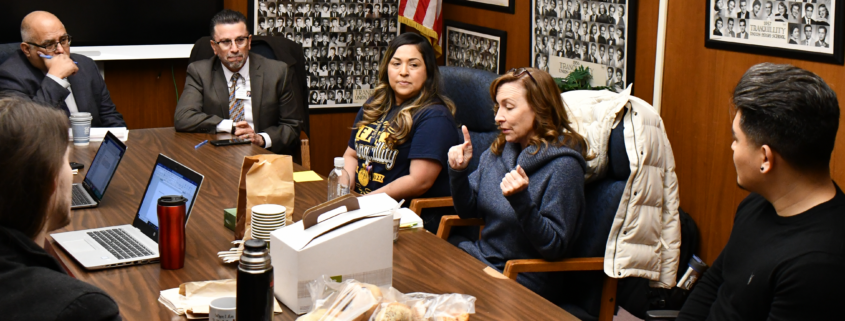The Central Valley Math Bridge Kick-off set for May 18 in Fresno
Rural high schools signing up for groundbreaking project that is ‘a model
for meaningful dual enrollment pathways that can be replicated statewide’
(UPDATE May 26, 2023) – See Math Bridge Kickoff May 18 coverage.
(MARCH 19, 2023) — The movement to promote equity and college-readiness in mathematics via dual enrollment courses for underprepared students at rural Central Valley high schools next fall will formally launch May 18 with the Central Valley Math Bridge Kick-off in downtown Fresno presented by co-hosts College Bridge, Central Valley Higher Education Consortium and the Rand Corporation.
The project, funded initially by a $4 million five-year Education Innovation and Research (EIR) Program federal grant awarded by the U.S. Department of Education to College Bridge in late December, targets six small CVHEC-member institutions partnering with 21 rural valley high schools in the colleges’ respective service areas.
The recruitment and onboarding of the Central Valley rural high schools is in full swing, said Dr. Lynn Cevallos, founder and president of College Bridge, announcing this week that 12 are presently confirmed.
The participating high schools to-date are: Amador (Sutter Creek), Argonot (Jackson), Boron, Clovis East, Clovis, Firebaugh, Orosi, Riverdale, Sanger, Sanger West, Tranquility and Taft.
The participating CVHEC colleges are: Cerro Coso, Clovis, Columbia, Madera, Reedley, Taft,West Hills College Coalinga and West Hills College Lemoore.
Eventually, a parallel project funded by the state in February through the Central San Joaquin K-16 Partnership — made up of the Fresno/Madera and the Tulare/Kings K-16 Collaboratives — will serve an additional two colleges and seven high schools in the region (details to come).
“A total of 32 high schools will participate and there is still room for seven more,” Cevallos said. “Any high school within the participating colleges’ service areas that serve low-income, minority or rural students and is interested in an innovative, proven math intervention should apply.”
Cevallos describes the DE Math Bridge as an innovative high school intervention that will close equity and attainment gaps in college math and college completion at the participating Central Valley rural high schools.
She noted that while the project’s target audience is nearly 8,000 low-income, Black or Latino, or rural 11th or 12th grade students who lack access to rigorous math courses, it will be open to all eligible students.
The May launch, at the DoubleTree by Hilton Hotel in Fresno, will convene the DE Math Bridge partners for the first of what will be an annual event where the partners will come together for intersegmental collaboration, Cevallos said.
She calls the convening a “getting-to-know-you” and a “roll-up-your-sleeves-and-go-to-work” session.
“This will allow all the DE Math Bridge partners in the Central Valley to connect as a group, building a unified project plan,” Cevallos said.
In the morning session, the college and secondary professionals will create a regional, intersegmental alignment of their student success goals, she explained. In the early afternoon, they will collaborate in a job-aligned “community of practice” to lay the foundational work for the project.
Dr. Benjamín Durán, CVHEC executive director, said the sessions will be designed around four communities of practice: leadership (administrators); student recruitment (counselors and advisors); curriculum and assessment (college and high school math teachers); and institutional research (IR and data staff).
“We are excited to shine a light on the great work that can come out of small colleges in the Central Valley and that we will share with the rest of the state and nationally,” said Duran, who also is president-emeritus of Merced College serving as CVHEC’s executive director since 2016.
“The DE Math Bridge Project, which will prepare and guide students as they transition to college or university equipped with math credits and confidence,” Duran said. “It creates a model for meaningful dual enrollment pathways and expansion that can be replicated in other regions of California serving underprepared students. This also supports CVHEC’s mission to increase the degree attainment rates.”
The consortium, made up of 28 institutions of higher education in the Central Valley’s nine-county region, is assisting the Dual Enrollment Math Bridge Project by using its role as a regional convener to bring the participating higher education and K-16 representatives together with College Bridge, a California non-profit based in Los Angeles County dedicated to forging a path towards both college access and success for underrepresented students.
Valley high schools interested in participating may contact Nicole Korgie at nicole.korgie@college-bridge.org.
For more information about the kick-off, contact Angel Ramirez, CVHEC operations manager at 559.292.0576 (centralvalleyhec@gmail.com).
UPDATES





Leave a Reply
Want to join the discussion?Feel free to contribute!